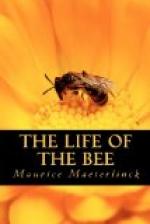To the young princesses, however, this prolonged reclusion is of material benefit; for when they at last are freed they have grown mature and vigorous, and are able to fly. But during this period of waiting the strength of the first queen has also increased, and is sufficient now to enable her to face the perils of the voyage. The time has arrived, therefore, for the departure of the second swarm, or “cast,” with the first-born of the queens at its head. No sooner has she gone than the workers left in the hive will set one of the prisoners free; and she will evince the same murderous desires, send forth the same cries of anger, until, at last, after three or four days, she will leave the hive in her turn, at the head of the tertiary swarm; and so in succession, in the case of “swarming fever,” till the mother-city shall be completely exhausted.
Swammerdam cites a hive that, through its swarms and the swarms of its swarms, was able in a single season to found no less than thirty colonies.
Such extraordinary multiplication is above all noticeable after disastrous winters; and one might almost believe that the bees, forever in touch with the secret desires of nature, are conscious of the dangers that menace their race. But at ordinary times this fever will rarely occur in a strong and well-governed hive. There are many that swarm only once; and some, indeed, not at all.
After the second swarm the bees, as a rule, will renounce further division, owing either to their having observed the excessive feebleness of their own stock, or to the prudence urged upon them by threatening skies. In that case they will allow the third queen to slaughter the captives; ordinary life will at once be resumed, and pursued with the more ardour for the reason that the workers are all very young, that the hive is depopulated and impoverished, and that there are great voids to fill before the arrival of winter.
[73]
The departure of the second and third swarms resembles that of the first, and the conditions are identical, with the exception that the bees are fewer in number, less circumspect, and lacking in scouts; and also that the young and virgin queen, being unencumbered and ardent, will fly much further, and in the first stage lead the swarm to a considerable distance from the hive. The conduct of these second and third migrations will be far more rash, and their future more problematical. The queen at their head, the representative of the future, has not yet been impregnated. Their entire destiny depends on the ensuing nuptial flight. A passing bird, a few drops of rain, a mistake, a cold wind—any one of these may give rise to irremediable disaster. Of this the bees are so well aware that when the young queen sallies forth in quest of her lover, they often will abandon the labours they have begun, will forsake the home of a day that already is dear to them, and accompany her in a body, dreading to let her pass out of their sight, eager, as they form closely around her, and shelter her beneath their myriad devoted wings, to lose themselves with her, should love cause her to stray so far from the hive that the as yet unfamiliar road of return shall grow blurred and hesitating in every memory.




